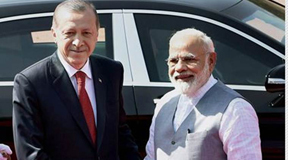 NEW DELHI: Prime Minister Narendra Modi on Friday said starting business in India is easier than ever before as procedures have been simplified, archaic laws repealed and compliance requirements reduced.
NEW DELHI: Prime Minister Narendra Modi on Friday said starting business in India is easier than ever before as procedures have been simplified, archaic laws repealed and compliance requirements reduced.
The reforms initiated by the government in the last three years have helped India jump 30 places since last year in the World Bank’s Ease of Doing Business ranking to break into the top 100-nation club.
“This is the highest ever improvement for India, and the highest jump for any country this year. From a rank of 142 in 2014, we have now reached the top 100,” he said at the World Food India 2017 conference here.
India, he said, ranked number one in the world in 2016 in greenfield investment and has also rapidly progressed on the Global Innovation Index, the Global Logistics Index and the Global Competitiveness Index.
“Starting a new business in India is now easier than ever before. Procedures for obtaining clearances from various agencies have been simplified. Archaic laws have been repealed, and the burden of compliances has been reduced,” he said.
Modi pitched India as one of the fastest growing economies of the world.
The introduction of Goods and Services Tax (GST) from July 1 has eliminated the multiplicity of taxes, he said further.
Incidentally, the World Bank’s Ease of Doing Business ranking does not take into account the impact of GST as June was set as cut-off for judging the parameters. It will be accounted for in next year’s ranking.
With CEOs of top global and Indian firms in the food processing sector in attendance, Modi invited investment in India’s food processing sector and promised full support.
“Come. Invest in India,” he said. “The place with unlimited opportunity from farm to fork. The place to produce, process, and prosper. For India, and for the world.”
The prime minister listed out “transformational initiatives” of the government in the food processing sector, namely allowing 100 per cent foreign direct investment (FDI) in trading, including through e-commerce, of food products manufactured or produced, single-window facilitation cell, attractive fiscal incentives and easy credit.
“Today, our strong agricultural base provides us a solid launch pad to create a vibrant food processing sector. Our vast consumer base, rising incomes, favorable investment climate and a government dedicated to ease of doing business, all make India ‘the place to be’ for the global food processing fraternity,” he said.
While private sector participation has been increasing in many segments of the value chain, more investment is required in contract farming, raw material sourcing and creating agri linkages, he emphasized.
“Many international companies in India have taken a lead in contract farming initiatives. This is a clear opportunity for global supermarket chains considering India as a major outsourcing hub,” he said.
Detailing investment opportunities, he said post-harvest management like primary processing and storage, preservation infrastructure, cold chain, and refrigerated transportation offer much potential. Also, there is immense potential for food processing and value addition, especially in niche areas such as organic and fortified foods.
According to Modi, increasing urbanization and a growing middle class are resulting in an ever-growing demand for wholesome, processed food.
Citing an example, he said over a million passengers have a meal on a train in India, every single day. “Each one of them is a potential customer for the food processing industry.
Such is the scale of opportunity that is waiting to be tapped,” the prime minister stressed.
He also highlighted combining traditional Indian food with modern technology, processing and packaging that can help the world rediscover health benefits and refreshing taste of Indian food ingredients such as turmeric, ginger and tulsi.
“The perfect blend of hygienic, nutritious and tasty processed food with the added benefits of preventive healthcare can be produced economically, here in India,” he said.
On initiatives for farmer welfare, the prime minister said the government is targeting doubling farm income within five years.
The recently-launched national level program, the Pradhan Mantri Kisan Sampada Yojana, with an aim to create world-class food processing infrastructure expects to leverage investment of USD 5 billion, benefit two million farmers and generate more than half a million jobs over the next three years.
Creation of mega food parks, using digital technology to improve last-mile delivery and simplifying processes and procedures are all aimed at stimulating investments, he said.
Modi called upon each state to identify at least one food product for specialization.
“Can we link our potential to the world’s requirements? Can we link Indian traditions with the future of mankind? Can we connect India’s farmers with markets around the world? These are some questions that I wish to leave you with,” he concluded.-PTI





